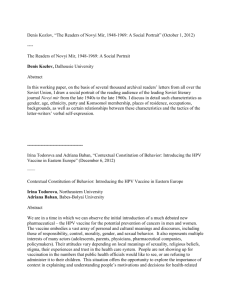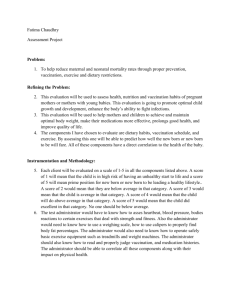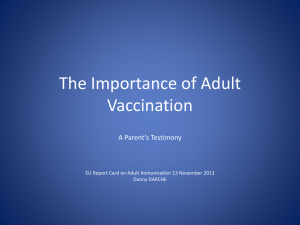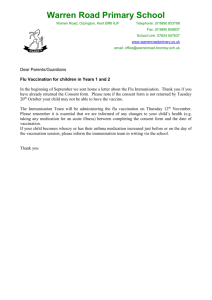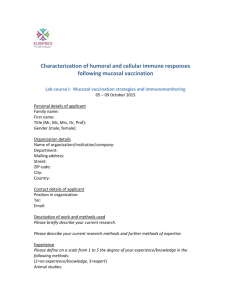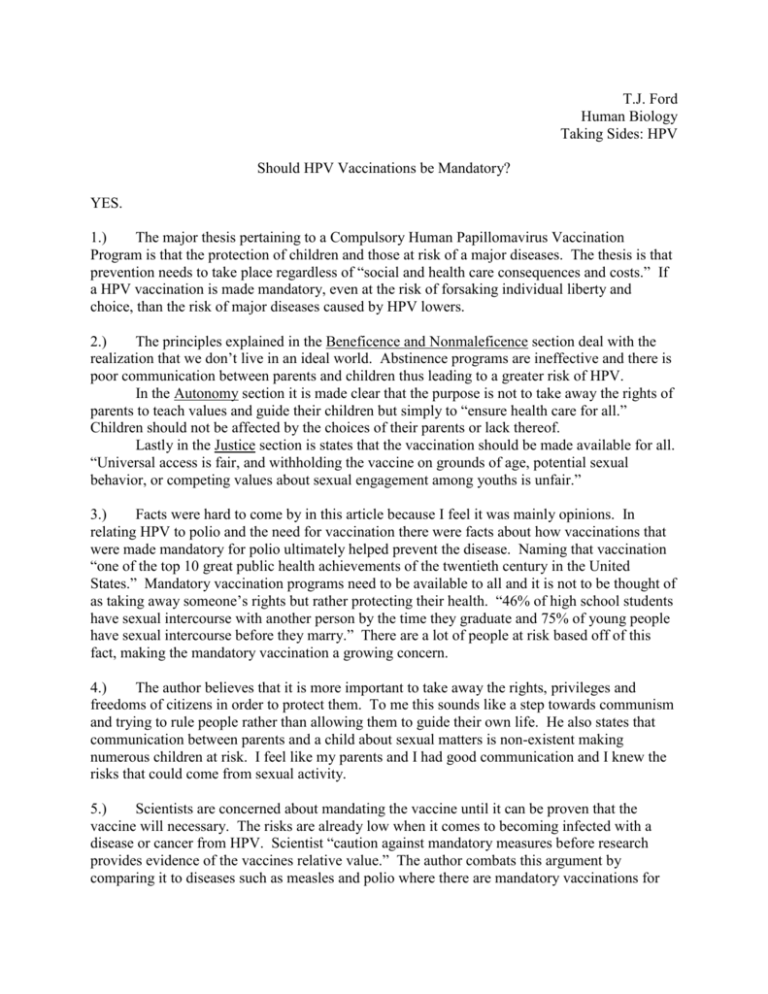
T.J. Ford
Human Biology
Taking Sides: HPV
Should HPV Vaccinations be Mandatory?
YES.
1.)
The major thesis pertaining to a Compulsory Human Papillomavirus Vaccination
Program is that the protection of children and those at risk of a major diseases. The thesis is that
prevention needs to take place regardless of “social and health care consequences and costs.” If
a HPV vaccination is made mandatory, even at the risk of forsaking individual liberty and
choice, than the risk of major diseases caused by HPV lowers.
2.)
The principles explained in the Beneficence and Nonmaleficence section deal with the
realization that we don’t live in an ideal world. Abstinence programs are ineffective and there is
poor communication between parents and children thus leading to a greater risk of HPV.
In the Autonomy section it is made clear that the purpose is not to take away the rights of
parents to teach values and guide their children but simply to “ensure health care for all.”
Children should not be affected by the choices of their parents or lack thereof.
Lastly in the Justice section is states that the vaccination should be made available for all.
“Universal access is fair, and withholding the vaccine on grounds of age, potential sexual
behavior, or competing values about sexual engagement among youths is unfair.”
3.)
Facts were hard to come by in this article because I feel it was mainly opinions. In
relating HPV to polio and the need for vaccination there were facts about how vaccinations that
were made mandatory for polio ultimately helped prevent the disease. Naming that vaccination
“one of the top 10 great public health achievements of the twentieth century in the United
States.” Mandatory vaccination programs need to be available to all and it is not to be thought of
as taking away someone’s rights but rather protecting their health. “46% of high school students
have sexual intercourse with another person by the time they graduate and 75% of young people
have sexual intercourse before they marry.” There are a lot of people at risk based off of this
fact, making the mandatory vaccination a growing concern.
4.)
The author believes that it is more important to take away the rights, privileges and
freedoms of citizens in order to protect them. To me this sounds like a step towards communism
and trying to rule people rather than allowing them to guide their own life. He also states that
communication between parents and a child about sexual matters is non-existent making
numerous children at risk. I feel like my parents and I had good communication and I knew the
risks that could come from sexual activity.
5.)
Scientists are concerned about mandating the vaccine until it can be proven that the
vaccine will necessary. The risks are already low when it comes to becoming infected with a
disease or cancer from HPV. Scientist “caution against mandatory measures before research
provides evidence of the vaccines relative value.” The author combats this argument by
comparing it to diseases such as measles and polio where there are mandatory vaccinations for
these diseases that have low incident rates. Then the author goes on to state that the difference is
that HPV deals with sexual before and thus raises moral, ethical and social concerns.
Scientists also bring up the fact that there is an “unspecified definition of imminent
harm.” To me this means that we don’t even know where to begin treating it, who is more at risk
than others and there is lack of evidence when it comes to the long term safety and efficacy of
the vaccine. The author then gives statistics that when the vaccination is combined with
screening treatments we “will achieve greater good for society than can be produced by either of
these health measures alone.”
6.)
In this article the author makes it known that he sees it necessary for these vaccinations to
be made mandatory regardless of what the general public may think. He believes that in certain
situations that it would be better to take away someone’s freedoms or change their moral outlook
to provide mandatory health care through these vaccinations. There could very well be a major
impact on the health of society if the mandatory vaccination goes through but also a great impact
on freedoms and having society feel like their rights are taken from them.
NO.
7.)
The major thesis for the opposing side of the mandatory vaccinations lies in the lack of
proof involving the vaccination. “The approval of a vaccine against cancer-causing HPV strains
is a significant public health advance, but strong legal, ethical, and policy arguments underlie or
position that state-mandated HPV vaccination of minor females is premature.” HPV vaccination
is not mandatory to attend school because the risk has yet to be proven.
8.)
“Long-Term Safety and Effectiveness of the Vaccine is Unknown.” There are a lot of
unknowns when it comes to this vaccination. First, what schedule does one need to get on when
taking this vaccine to have the best result? Second, there are concerns that the vaccine has a
negative impact on screening programs which have already been proven to be highly effective.
“Historical Justifications for Mandated Vaccination Are Not Met.” There are certain
vaccinations that have been proven necessary to make mandatory and HPV is not one of them. It
has not been proven to be highly contagious, which all of the mandatory vaccinations have.
“Government Risks Public Backlash Due to Absence of Historical Justification.” With
the lack of knowledge of the product and not knowing if the need is there, the government risks
backlashing if it makes it mandatory for students to get this vaccination to attend school. “The
rash of state legislation to mandate HPV has led to significant public concern that the
government is overreaching its police powers authority.
9.)
There are concerns with the vaccination. How long the vaccination will keep one clean,
what is the time frame of taking these shots, and there is no proof that non-sexual transmission is
possible.
10.) The author states his opinions on the vaccination when he mentions that removal of
parental autonomy is not warranted and risk the rejection of parents not only to the vaccine but
the government trying to make it mandatory for them to have it. Also he mentions that once
vaccinations have been issued those cases should be followed for several years before any
mandates are issued.
11.) The author is not trying to say no to the vaccination nor is he saying that it is not a
benefit. I believe that they agree with the vaccination but do not believe that there is enough
support behind it to make it mandatory for teenage girls. “Vaccinating girls against HPV before
they are sexually active appears to provide significant protection against cervical cancer.” This
statement shows that they are behind the vaccination and the benefits that it has but they go on to
state, “the vaccination is relatively new, and long-term safety and effectiveness in the general
population is unknown.” Until the vaccine has been tested and figured out the author simply
believes that it is “pre-mature and ill advised” to make it mandatory.
12.) One of the points that the authors made was the concern as to whether there will be a
negative impact from the vaccination on the cervical cancer screening. This is a concern because
the screenings for cervical cancer have been proven highly effective at reducing the risk of
cervical cancer. If they were to make the vaccination mandatory how would it be handled by
parents and society? The liberal opt-out issue deals with people not just disagreeing with the
treatment and because it goes against their beliefs but rather that they just don’t see that their
children are that much at risk to make them get the vaccination.
13.) I would argue that the author on the “YES” side of the article was the most evidence
based, and rightfully so. He is trying to convince the reader that the vaccination is necessary
enough that it needs to be mandated for teenage girls before they begin sexual activity. He states
the facts of how many high school students are participating in sexual activity as a reason for the
necessity to mandate this vaccination. I don’t believe that there is any reason to believe that
these writers are biased, the main thing I get out of the article is genuine concern for the health of
others and trying to prevent future problems.
14.) I feel that the “NO” side is the most correct because it takes all sides and opinions into
account. They are not trying to disagree that the vaccination is going to be a good thing for
people to have but they want all angles to be figured out before they make it mandatory for
teenage girls to take. They want to know what the long term effects of the vaccination are going
to be before they issue it out and is the vaccination really going to have that much of an impact
as to whether or not people will get these diseases.
15.) Mandating the vaccine for teenage boys wouldn’t make as much since because a lot of
the main points that were made deal with this vaccination prevent cervical cancer and men don’t
have that chance. I see less of an importance for males do get it so I would definitely be on the
“NO” when it came to men. I would first make it mandatory for girls because of the serious
effects that HPV can have on them.
16.) I think a flu shot should be mandatory for all people ages 6 to 65 because of the way that
the flu travels from person to person. As stated in the “NO” article all the diseases where there
has been a mandatory vaccination are one’s that are highly contagious. “The diseases they
prevent are highly contagious and are associated with significant morbidity and mortality
occurring shortly after exposure.” I believe that the flu falls into this category as it is highly
contagious and if not treated it can become deadly. Death tolls range from 3,000 to 49,000 and
to me that should be cause for a mandatory shot to take place.


